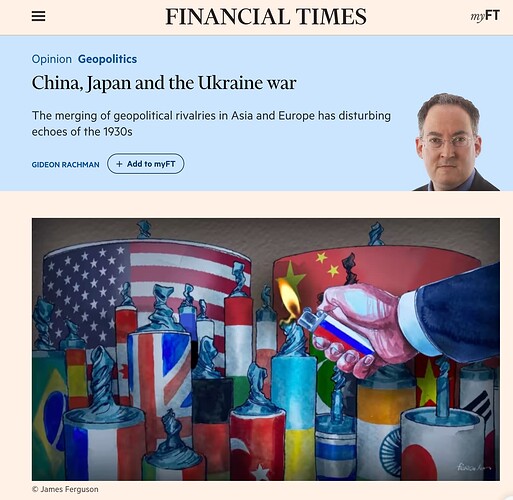-
上周,中国国家主席习近平和日本首相岸田文雄都同时对俄罗斯和乌克兰的首都进行了竞争性访问,强调了乌克兰战争的全球意义。
-
中国和日本是东亚地区的激烈对手,并明白他们的斗争将受到欧洲冲突结果的深刻影响。
-
俄中轴线正在延伸到欧亚大陆,莫斯科和北京正在拉近与伊朗的关系,并支持朝鲜的 “合法和合理关切”。
-
美国正在鼓励美国的亚洲和欧洲盟友之间加强联系,其中以日本为首。
-
去年,日本、韩国、澳大利亚和新西兰首次参加了北约峰会,这四个国家也将于7月参加在立陶宛举行的北约峰会。
-
莫斯科和北京对北约和亚太国家之间加强军事安全关系表示 “严重关切”,并谴责澳大利亚、英国和美国之间的新安全条约。
-
欧洲领导人不久将访问北京,以测试中国在乌克兰问题上的立场,但习近平不太可能给他们更多温暖的话语。
-
中国和俄罗斯可能对他们的行动令欧洲和亚洲的民主国家感到震惊的方式视而不见。
-
美国处于俄中联盟和与美国紧密结盟的民主国家集团之间的单一地缘政治斗争的中心。
-
日本认为普京对乌克兰的攻击是专制国家崛起的证据。
-
日本担心俄罗斯的胜利会使中国在他们的地区更加大胆。
-
日本增加了他们的国防开支,岸田首相自1945年以来首次访问了一个战区。
-
两个对立的全球集团的出现引发了关于新冷战的讨论,俄中联盟与美国领导的民主国家联盟对峙。
-
1941年日本的帝国领导层认为美国和英国正在强加一个统治世界的体系,与目前俄罗斯和中国媒体的抱怨相似。
-
日本看到了希特勒在欧洲的成功,并通过向东南亚扩张做出了回应,导致了与美国的战争。
-
普京在欧洲的成功可能导致中国得出类似的结论并决定采取行动。
-
欧洲战争的爆发,加上亚洲日益紧张的局势,反映了1930年代的情况。
-
各方都有责任确保欧洲和亚洲的竞争不会导致全球悲剧的发生。
-
Last week, Chinese President Xi Jinping and Japanese Prime Minister Fumio Kishida both paid simultaneous and competing visits to the capitals of Russia and Ukraine, underlining the global significance of the Ukraine war.
-
China and Japan are fierce rivals in East Asia and understand that their struggle will be profoundly affected by the outcome of the conflict in Europe.
-
The Russia-China axis is stretching across the Eurasian landmass, with Moscow and Beijing drawing closer to Iran and backing North Korea’s “legitimate and reasonable concerns”.
-
The US is encouraging a tightening of links between America’s Asian and European allies, with Japan foremost among them.
-
Last year, Japan, South Korea, Australia, and New Zealand attended a NATO summit for the first time, and the same four countries will attend a NATO summit in Lithuania in July.
-
Moscow and Beijing expressed “serious concern” over the strengthening of military security ties between the NATO and Asia-Pacific countries, and condemned the new security pact between Australia, the UK, and the US.
-
European leaders will soon visit Beijing to test where China stands on Ukraine, but Xi is unlikely to give them more than warm words.
-
China and Russia may be blind to the way in which their actions have alarmed the democracies of Europe and Asia.
-
The US is at the center of a single geopolitical struggle between the Russia-China alliance and the group of democracies closely allied to the US.
-
Japan views Putin’s assault on Ukraine as evidence of authoritarian powers on the rise.
-
Japan fears a Russian victory could embolden China in their region.
-
Japan increased their defense spending and Prime Minister Kishida visited a war zone for the first time since 1945.
-
The emergence of two rival global blocs has sparked talk of a new cold war, with a Russia-China alliance facing off against a US-led coalition of democracies.
-
Japan’s Imperial leadership in 1941 felt the US and UK were imposing a system of world domination, similar to current complaints from Russian and Chinese media.
-
Japan saw Hitler’s successes in Europe and responded by expanding into Southeast Asia, leading to a war with the US.
-
Putin’s successes in Europe could cause China to draw similar conclusions and decide to act.
-
The outbreak of war in Europe, combined with the growing tensions in Asia, mirror the 1930s.
-
All sides have a responsibility to make sure rivalries in Europe and Asia do not lead to global tragedy.
